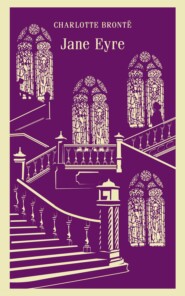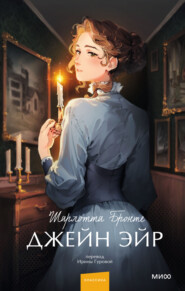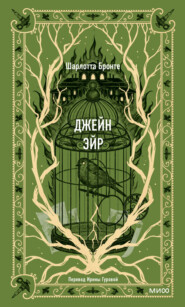По всем вопросам обращайтесь на: info@litportal.ru
(©) 2003-2024.
✖
Villette
Настройки чтения
Размер шрифта
Высота строк
Поля
He deemed me born under his star: he seemed to have spread over me its beam like a banner. Once – unknown, and unloved, I held him harsh and strange; the low stature, the wiry make, the angles, the darkness, the manner, displeased me. Now, penetrated with his influence, and living by his affection, having his worth by intellect, and his goodness by heart – I preferred him before all humanity.
We parted: he gave me his pledge, and then his farewell. We parted: the next day – he sailed.
CHAPTER XLII.
FINIS
Man cannot prophesy. Love is no oracle. Fear sometimes imagines a vain thing. Those years of absence! How had I sickened over their anticipation! The woe they must bring seemed certain as death. I knew the nature of their course: I never had doubt how it would harrow as it went. The juggernaut on his car towered there a grim load. Seeing him draw nigh, burying his broad wheels in the oppressed soil – I, the prostrate votary – felt beforehand the annihilating craunch.
Strange to say – strange, yet true, and owning many parallels in life's experience – that anticipatory craunch proved all – yes – nearly all the torture. The great Juggernaut, in his great chariot, drew on lofty, loud, and sullen. He passed quietly, like a shadow sweeping the sky, at noon. Nothing but a chilling dimness was seen or felt. I looked up. Chariot and demon charioteer were gone by; the votary still lived.
M. Emanuel was away three years. Reader, they were the three happiest years of my life. Do you scout the paradox? Listen. I commenced my school; I worked – I worked hard. I deemed myself the steward of his property, and determined, God willing, to render a good account. Pupils came – burghers at first – a higher class ere long. About the middle of the second year an unexpected chance threw into my hands an additional hundred pounds: one day I received from England a letter containing that sum. It came from Mr. Marchmont, the cousin and heir of my dear and dead mistress. He was just recovering from a dangerous illness; the money was a peace-offering to his conscience, reproaching him in the matter of, I know not what, papers or memoranda found after his kinswoman's death – naming or recommending Lucy Snowe. Mrs. Barrett had given him my address. How far his conscience had been sinned against, I never inquired. I asked no questions, but took the cash and made it useful.
With this hundred pounds I ventured to take the house adjoining mine. I would not leave that which M. Paul had chosen, in which he had left, and where he expected again to find me. My externat became a pensionnat; that also prospered.
The secret of my success did not lie so much in myself, in any endowment, any power of mine, as in a new state of circumstances, a wonderfully changed life, a relieved heart. The spring which moved my energies lay far away beyond seas, in an Indian isle. At parting, I had been left a legacy; such a thought for the present, such a hope for the future, such a motive for a persevering, a laborious, an enterprising, a patient and a brave course – I could not flag. Few things shook me now; few things had importance to vex, intimidate, or depress me: most things pleased – mere trifles had a charm.
Do not think that this genial flame sustained itself, or lived wholly on a bequeathed hope or a parting promise. A generous provider supplied bounteous fuel. I was spared all chill, all stint; I was not suffered to fear penury; I was not tried with suspense. By every vessel he wrote; he wrote as he gave and as he loved, in full-handed, full-hearted plenitude. He wrote because he liked to write; he did not abridge, because he cared not to abridge. He sat down, he took pen and paper, because he loved Lucy and had much to say to her; because he was faithful and thoughtful, because he was tender and true. There was no sham and no cheat, and no hollow unreal in him. Apology never dropped her slippery oil on his lips – never proffered, by his pen, her coward feints and paltry nullities: he would give neither a stone, nor an excuse – neither a scorpion; nor a disappointment; his letters were real food that nourished, living water that refreshed.
And was I grateful? God knows! I believe that scarce a living being so remembered, so sustained, dealt with in kind so constant, honourable and noble, could be otherwise than grateful to the death.
Adherent to his own religion (in him was not the stuff of which is made the facile apostate), he freely left me my pure faith. He did not tease nor tempt. He said: —
"Remain a Protestant. My little English Puritan, I love Protestantism in you. I own its severe charm. There is something in its ritual I cannot receive myself, but it is the sole creed for 'Lucy.'"
All Rome could not put into him bigotry, nor the Propaganda itself make him a real Jesuit. He was born honest, and not false – artless, and not cunning – a freeman, and not a slave. His tenderness had rendered him ductile in a priest's hands, his affection, his devotedness, his sincere pious enthusiasm blinded his kind eyes sometimes, made him abandon justice to himself to do the work of craft, and serve the ends of selfishness; but these are faults so rare to find, so costly to their owner to indulge, we scarce know whether they will not one day be reckoned amongst the jewels.
* * * * *
And now the three years are past: M. Emanuel's return is fixed. It is Autumn; he is to be with me ere the mists of November come. My school flourishes, my house is ready: I have made him a little library, filled its shelves with the books he left in my care: I have cultivated out of love for him (I was naturally no florist) the plants he preferred, and some of them are yet in bloom. I thought I loved him when he went away; I love him now in another degree: he is more my own.
The sun passes the equinox; the days shorten, the leaves grow sere; but – he is coming.
Frosts appear at night; November has sent his fogs in advance; the wind takes its autumn moan; but – he is coming.
The skies hang full and dark – a wrack sails from the west; the clouds cast themselves into strange forms – arches and broad radiations; there rise resplendent mornings – glorious, royal, purple as monarch in his state; the heavens are one flame; so wild are they, they rival battle at its thickest – so bloody, they shame Victory in her pride. I know some signs of the sky; I have noted them ever since childhood. God watch that sail! Oh! guard it!
The wind shifts to the west. Peace, peace, Banshee – "keening" at every window! It will rise – it will swell – it shrieks out long: wander as I may through the house this night, I cannot lull the blast. The advancing hours make it strong: by midnight, all sleepless watchers hear and fear a wild south-west storm. That storm roared frenzied, for seven days. It did not cease till the Atlantic was strewn with wrecks: it did not lull till the deeps had gorged their full of sustenance. Not till the destroying angel of tempest had achieved his perfect work, would he fold the wings whose waft was thunder – the tremor of whose plumes was storm.
Peace, be still! Oh! a thousand weepers, praying in agony on waiting shores, listened for that voice, but it was not uttered – not uttered till; when the hush came, some could not feel it: till, when the sun returned, his light was night to some!
Here pause: pause at once. There is enough said. Trouble no quiet, kind heart; leave sunny imaginations hope. Let it be theirs to conceive the delight of joy born again fresh out of great terror, the rapture of rescue from peril, the wondrous reprieve from dread, the fruition of return. Let them picture union and a happy succeeding life.
Madame Beck prospered all the days of her life; so did Père Silas;
Madame Walravens fulfilled her ninetieth year before she died. Farewell.
THE END

















